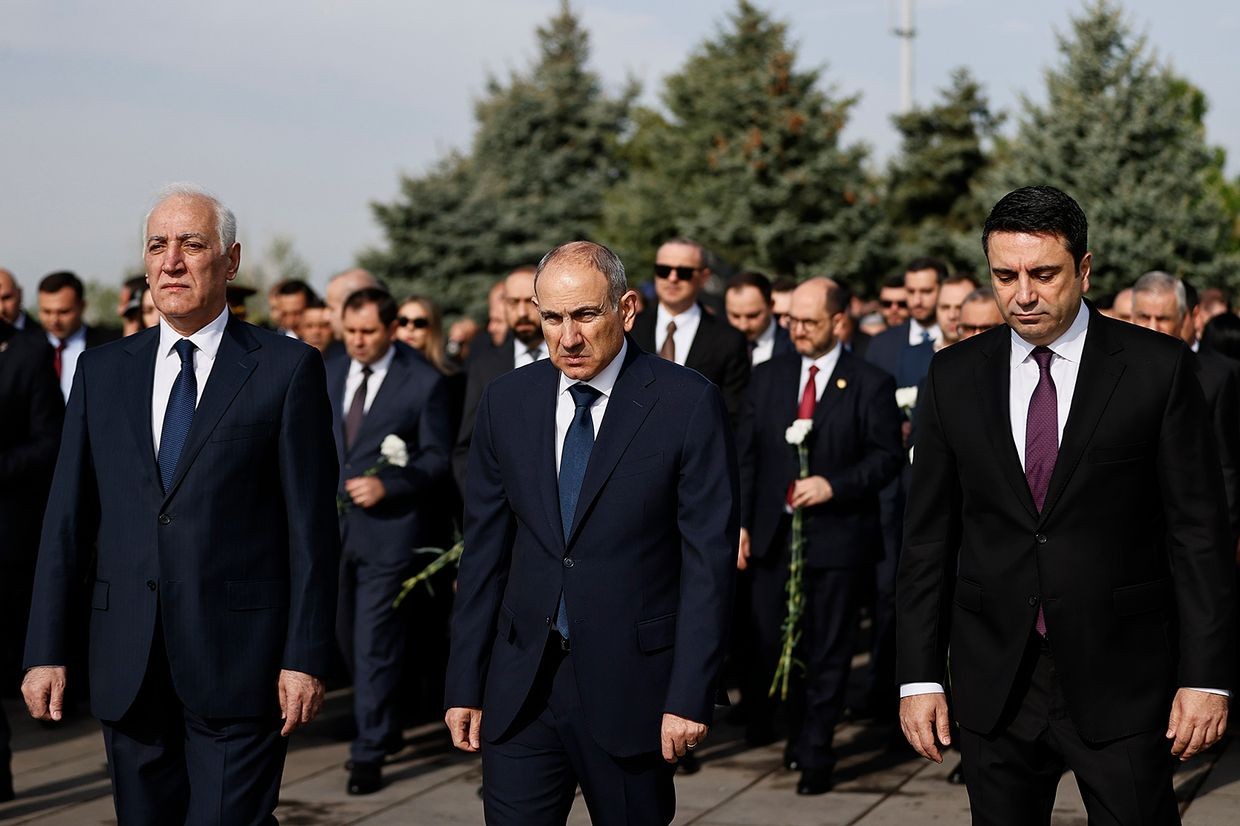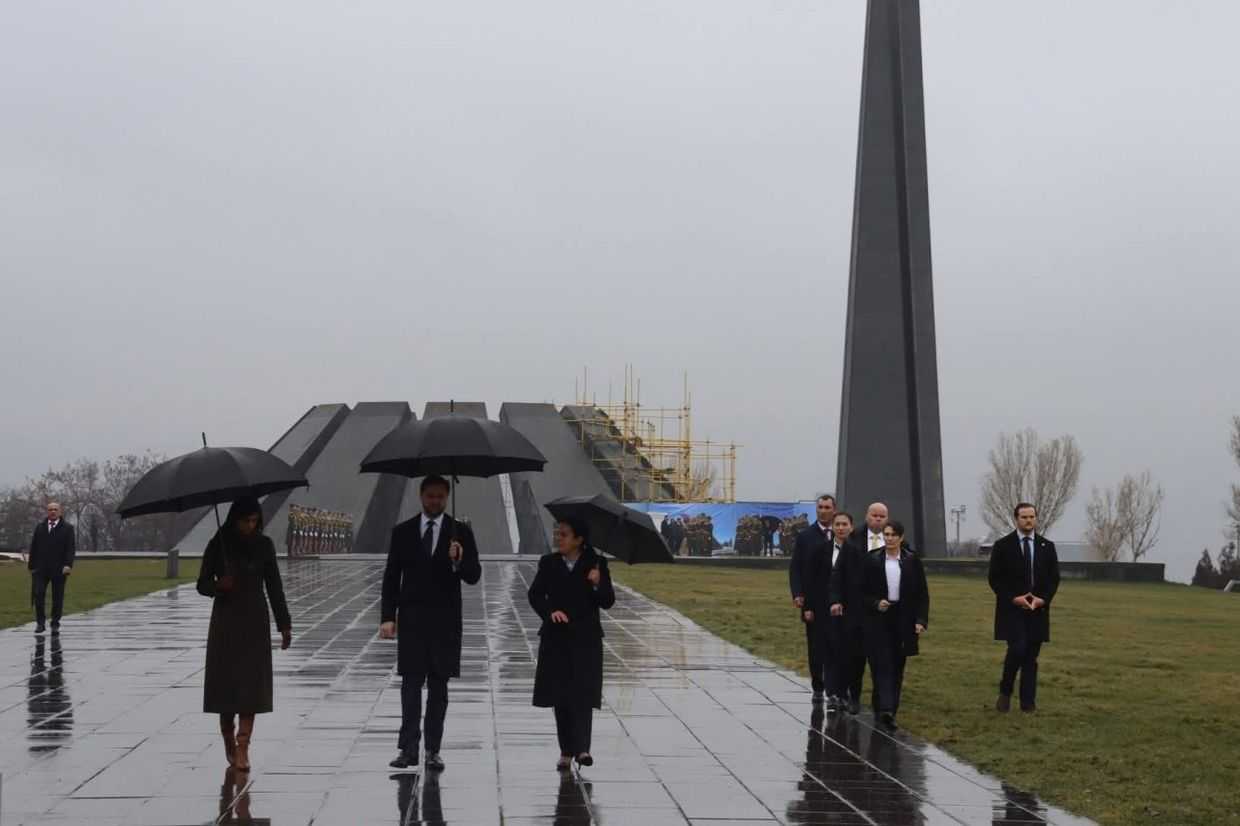Conflicting messaging on Armenian Genocide as Armenia commemorates 110th anniversary

On 24 April, Armenians commemorated the 110th anniversary of their genocide, with Prime Minister Nikol Pashinyan arguing Armenia must clearly define its borders and sovereignty in order to ‘survive the tragedy’ of the genocide. In stark contrast to his messaging, former President Serzh Sargsyan accused Pashinyan of using the genocide as a ‘bargaining chip’ and treating it like an ‘obstacle to peace’.
In his message commemorating the anniversary of the genocide, Armenian Prime Minister Nikol Pashinyan said that the massacre and mass deportations of Armenians in the Ottoman Empire ‘left a deep mark on the soul and consciousness of every Armenian; for many citizens of Armenia, the genocide is not only a national, but also a family, personal tragedy’.
The Armenian Genocide orchestrated by the Ottoman Empire between 1915 and 1923 led to the mass killings of nearly 1.5 million Armenians living in Western Armenia — modern-day eastern Turkey.
In his message, Pashinyan went on to say that surviving the genocide ‘has been one of the key issues on our national agenda for more than a century’.
‘The reflections and thoughts of the government and myself on this agenda lead to the following: a Republic of Armenia that is developed, sovereign, secure, that is, with demarcated borders, is the means to survive the tragedy of the Medz Yeghern [the Armenian Genocide], the guarantee of our loyalty to all the sacrifices and victims of our people.’
He said that Armenians should survive the tragedy of the genocide and keep the memory of its victims alive through achieving an ‘internationally recognised territory, regulated relations with neighbours, open borders, peace, work, prosperity, a free and protected citizen’.
Pashinyan was likely responding to domestic criticism of the ongoing peace and border demarcation talks with Azerbaijan.
‘Going this way is not a matter of optimism or pessimism, but of a mission, to ensure the permanence of the Republic of Armenia, our homeland-state, and having gone through severe trials and tragedies, we have earned this opportunity and this opportunity must not be missed.’
Pashinyan and President Vahagn Khachaturyan have also visited and laid a wreath at Tsitsernakaberd, the Armenian Genocide memorial in Yerevan.
‘Armenian Genocide cannot be presented as an obstacle to peace’
In contrast to Pashinyan’s message, former President Serzh Sargsyan said that while the victims of the Armenian Genocide ‘cannot demand justice’ for the atrocities committed against them, ‘we — dignified Armenians, along with the civilised world must become their voice which must sound louder and louder’.
‘No crime must go unpunished. No people must carry the burden of the failed justice. More than a hundred years later, the ongoing genocides against humanity indicate clearly where the criminal silence and indifference will get us. We have no right to remain silent or even worse — to forget, and those who neglect or doubt the fact of the genocide become the direct accomplices of this crime.’
Sargsyan also extended his condemnation towards Azerbaijan for its takeover of Nagorno-Karabakh in September 2023, which he called the ‘continuation of the genocide’.
‘In September 2023, with the apparent support of Turkey, Azerbaijan carried out ethnic cleansing and forcibly expelled over 140,000 Armenians of [Nagorno-Karabakh] from their ancestral land: This was the continuation of the genocide which was committed over one hundred years ago and has not been condemned’.
‘Following in the footsteps of the Ottoman Empire, today Azerbaijan in [Nagorno-Karabakh] is consistently erasing Armenian traces, the millennia-long spiritual, religious, and cultural heritage, distorting history’, he said.
The former president went on to further indirectly criticise Pashinyan’s government for its handling of the memory of the genocide.
‘The rulers of Armenia must not forget that the millions of lives that were disrupted 110 years ago, during these very days, can never become a bargaining chip, that the undeniable fact of the Armenian Genocide cannot be presented as an “obstacle to peace.” ’
He called Pashinyan’s approach ‘nothing short of political immorality and betrayal’, and suggested that it was borne out of the ‘craving to preserve one’s high position’.
‘The authorities, which disregard our national interests and endanger the very existence of the state, must be removed, since the shortest road to losing statehood lies in renouncing our own rights and our dignity, in renouncing the struggle for justice and in erasing the historical memory.’
Sargsyan served as President of Armenia from 2008–2018, before being appointed Prime Minister. A referendum to transform Armenia from a presidential to a parliamentary system undertaken by his government was widely seen as a way for him to hold on to power and circumvent the country’s presidential term limit.
He continues to be a key figure in Armenia’s political opposition.
Nagorno-Karabakh’s Parliament has also criticised the Armenian government in its own message commemorating the genocide, calling Yerevan’s position ‘incomprehensible and inexplicable in this reality’.
‘Condemning the genocide and holding the perpetrators accountable are among the guarantees of preventing future genocides, which, of course, do not replace the state’s mandatory strong security system and far-sighted domestic and foreign policy’, it said.
Accusations of genocide denial within Armenia
Pashinyan and his government have increasingly gone under fire for their statements regarding the genocide and Armenian history within the context of Armenia’s ongoing peace talks with Azerbaijan.
Notably, Pashinyan has on numerous occasions brought up what he referred to as the ideology of ‘Real Armenia’ — a concept he first voiced in April 2024, insisting that Armenians must accept modern Armenia within its current borders, and not within its historical borders.
In February, he presented a draft of the ideology, which argued that Armenia’s Constitution required changes.

‘The citizens of Armenia should perceive themselves, and perhaps do perceive them, as the founders of the Republic of Armenia, but they should also perceive themselves as the founders of the legal relations, the constitutional order, that is, the system of rights and obligations established in [Armenia]’, he said while elaborating on the need to change the constitution.
Even though Pashinyan said that he has talked about the need to change the constitution since February 2020, his critics argue that the proposal is connected to Azerbaijani demands.
Changing the Armenian Constitution is a demand pushed by the Azerbaijani government, with Azerbaijani President Ilham Aliyev stating that it would be ‘simply impossible’ to reach a peace deal if the Armenian Constitution ‘remains unchanged’. Aliyev claims that the constitution as currently phrased lays claim to territories in Azerbaijan and Turkey.
Earlier this week, a scuffle broke out in Armenia’s Parliament following the introduction of a bill by the opposition Armenia Alliance faction that broadens the spectrum for criminal culpability for denying the Armenian Genocide, as well as increasing the punishments.
Members of the ruling Civil Contract party have claimed that such changes are unnecessary because under current law, denying the Armenian Genocide is already criminalised, with penalities including significant fines as well as a maximum prison sentence of four years.











